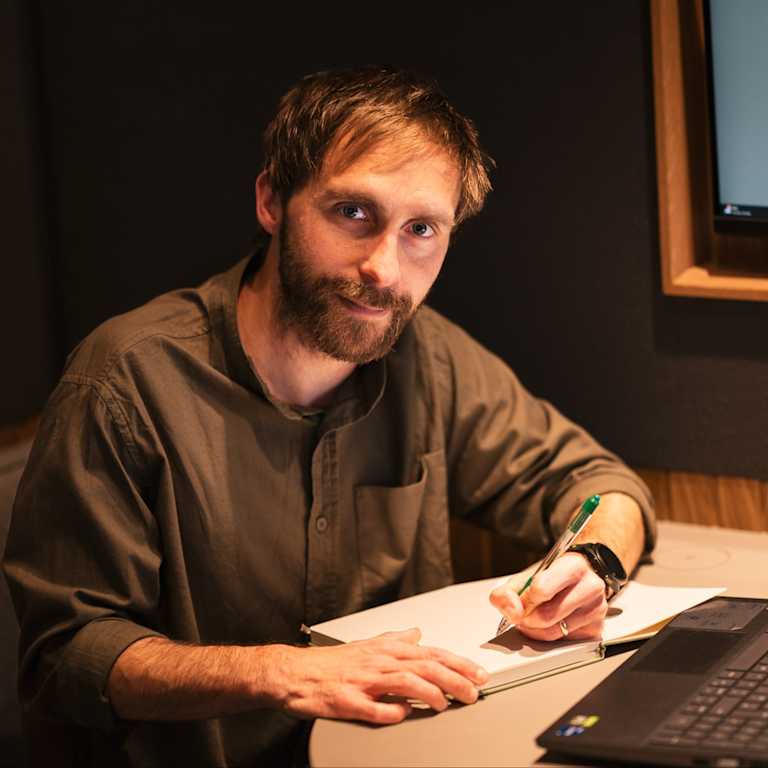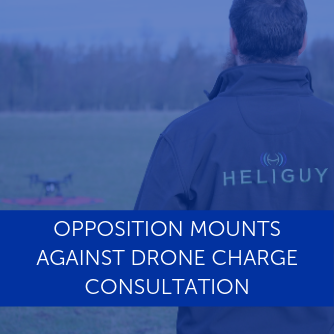
News
Published on 3 May 2019
James Willoughby
Drone Registration Scheme - Is £16.50 Too Much?
Opposition mounts against controversial proposal to charge UAV operators as part of the UK Drone Registration Scheme, with critics branding the idea outrageous. ... Read More
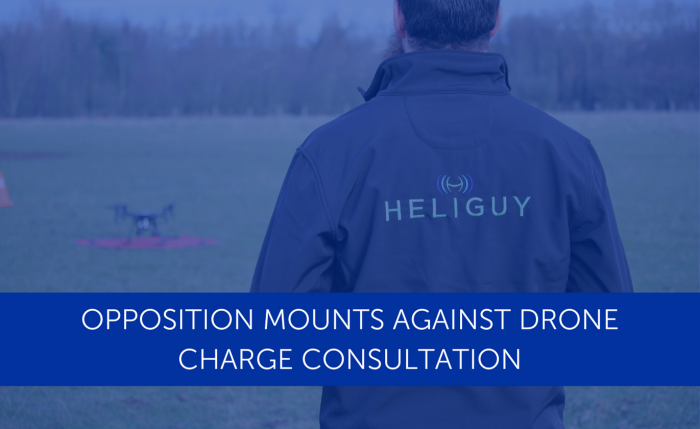
Opposition is mounting against a controversial proposal to charge UAV operators as part of the UK Drone Registration Scheme, with critics blasting the idea as outrageous and detrimental to the future of model flying.
Battle lines are being drawn throughout the industry following the start of a Civil Aviation Authority (CAA) consultation which sets out a plan to introduce an annual £16.50 fee for drone operators whose aircraft is between 250 grams and 20 kilograms.
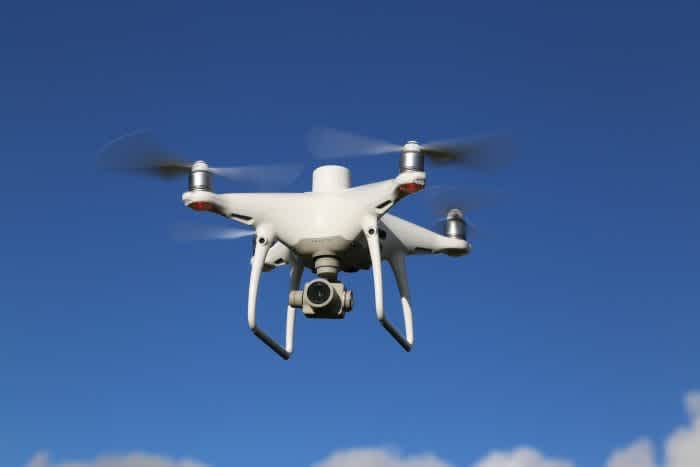
A DJI Phantom 4 RTK. If you operate one of these, you'll need to register.
Disgruntled commercial pilots and hobbyists have voiced a string of negative comments, describing the payment as an over-expensive tax which will do little to clamp down on the thorny issue of rogue drone use - a topic which has caused much press hysteria in the aftermath of the Christmas-time disruption at Gatwick Airport.
Meanwhile, numerous PfCO (Permission for Commercial Operators) holders have taken to social media to brand the fee a double whammy, considering they already pay for a permission to fly and are already authorised by the CAA. Others in the drone world fear that registration will have a detrimental impact on the UAV (unmanned aerial vehicle) industry.
FPV-UK: "£16.50 per year is bound to put a lot of people off flying in the UK."
The wave of opposition is so strong in some quarters that the FPV-UK - an association of recreational radio control drone and model aircraft pilots - has issued a rallying call to urge all objectors to contact their local MP; the Aviation Minister - Baroness Vere of Norbiton; and the CAA's chief executive Richard Moriarty.
However, opposition isn't entirely universal, with some endorsing the proposal. Arguments include that £16.50 isn't a huge charge and that the cost of an angler's licence, for example, brings a heftier annual fee.
In this blog post, Heliguy Insider takes a look at the consultation and examines why the proposal is proving so controversial in the industry.
Read the consultation in full and give your views
What Exactly Is The Proposal?
First of all, what exactly is the CAA proposing and how has this come about?
Last Friday, the CAA launched the consultation to thrash out the idea of charging drone users to cover the costs of running the UK Drone Registration Scheme (DRS).
The proposal is to charge drone operators £16.50 per year to cover the costs of the UK Drone Registration Scheme
The DRS is due to be launched from October 1 this year and all those in the UK who operate drones or model aircraft between 250 grams and 20 kilograms must register by the end of November 2019. From the same period, remote pilots will be required to take an online safety test. Failure to comply with these rules could lead to a £1,000 fine.
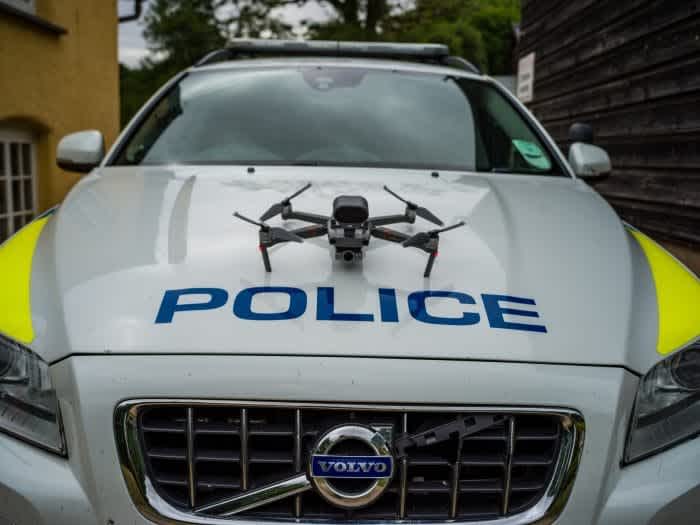
Police have greater powers to tackle rogue drone use.
Those behind the proposals say that this legislation has been brought in to strengthen the accountability of drone users and their awareness of how to fly their drones safely.
The Government has provided a significant amount of taxpayer funding to cover the costs of developing the DRS up until October 1, 2019. From that date onwards, the costs of running the scheme will be borne by those who use it under the 'user pays' principle. This is because as a statutory body, the CAA has to recover its costs from those it regulates.
The consultation document says that this legislation has been brought in to strengthen the accountability of drone users and their awareness of how to fly their drones safely.
The CAA is proposing an annual charge of £16.50 for each operator. This is to cover the costs of running the registration scheme, which includes:
IT hosting and security costs;
CAA personnel and helpdesk;
Identity verification;
A national education and awareness campaign;
Costs of further upgrades to the initial drone registration service.
The CAA estimates that the scheme's running costs for the period October 1, 2019, to March 31, 2020, will be £1.3million, with an ongoing annual cost of approximately £2.8million.
It has based these costs on an assumption of 170,000 registrations over the initial 18 month period, though the authority welcomes any additional information about the numbers of drone and model aircraft users.
Relating to the proposed charge, the CAA says: "We believe our charging proposal represents a balance between keeping the charge for registration low and ensuring that the scheme covers its costs. We welcome feedback on this charging proposal."
At this point, it is important to state that the CAA has said that it will review the drone registration charge after its introduction and implement any changes from April 2021, including whether a three year rather than annual renewal period is more appropriate.
Perhaps a three-year charge would ease the tension somewhat, but only time will tell if this actually materialises.
As a sideline, but valid nonetheless, the CAA’s development plan for the DRS sets the minimum age of registering for operators as 18. This is on the basis that the Government has previously said that it supports the introduction of a minimum age of 18 for operators, but no minimum age for remote pilots.
Read the consultation in full and give your views
What Are The Sticking Points And Why The Furore?
Make no bones about it, the charging proposal has caused wide-spread anger throughout the industry. And the trigger points are multiple!
Firstly, opponents are pointing to the fact that the £16.50 charge greatly outweighs the cost of registration in other nations. And they have a point.
In France, for instance, registering your drone is free and is valid for five years. In the USA, there is a $5 (just under £4) charge per aircraft, valid for three years. Although this could perhaps mount up if you own multiple UAVs. In Ireland, the cost is €5 (£4.29).

It is free to register your drone in France. Picture by Jad Limcaco
In Australia, plans are being finalised for a Drone Registration and Accreditation Scheme. A consultation closed earlier this year and feedback was sought on the details.
Under the proposals, accreditation will be free, but there is set to be a cost for registration; the price of which will be determined by how you use your drone. It is likely to be a $20 (just under £11) or less annual fee (per person) for recreational drones and for some model aircraft operators. There will also be an annual registration fee likely to range from $100 to $160 (£53.93-£86.28) per drone, for each commercial drone.

A drone-registration charge looks likely to be introduced in Australia. Picture by Keith Zhu
So, perhaps drone users in Oz will have more reason to grumble, but make no mistake, the proposed charge in the UK is set to be higher than other nations.
As one Facebook commentator states: "The fee the CAA is proposing is £16.50 per annum which is significantly more than the cost levied on model flyers in any other EASA (European Aviation Safety Agency country), something they have conveniently omitted from the comparison figures in the document. An interesting direct comparison not included is France, where their equivalent registration scheme is completely free and valid for five years."
Drone Registration Fee Versus Other Licences
Another talking point is how the proposed drone charge compares to similar registration schemes in other sectors. It makes for interesting reading.
The drone fee is more pricey, year-on-year, than a UK driving licence or passport, for instance. Let's take a look at the maths.
Drivers have to pay a £14 renewal fee every 10 years, which equates to an annual price of £1.40. Even if you bolt-on the one-off £34 charge for the provisional licence, the price per year would still work out cheaper, totalling £4.80 annually.
The annual charges of a UK driving licence and a UK passport are both less than the proposed drone charge, but a fishing licence is significantly higher
It's a similar story for the passport, which costs £75.50 (online price) per 10 years, or £7.50 annually.
However, on the other side of the coin, things start to get a bit more pricey for anglers and those who use guns.
Anglers, in particular, face a more substantial bill for their hobby, with a fishing licence ranging from between £30 to £82 per year.
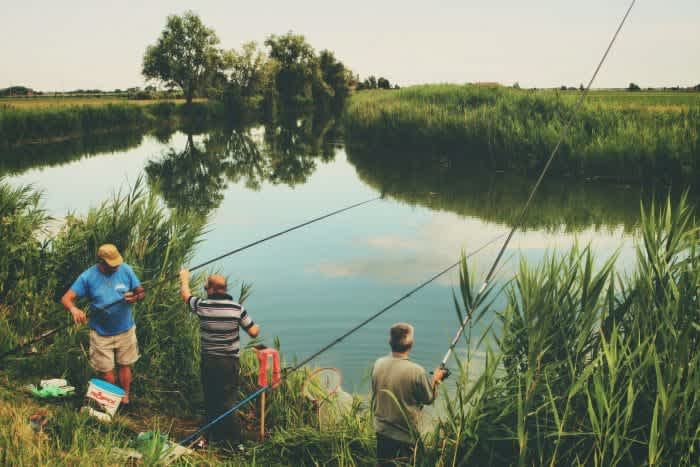
The cost of a fishing licence varies from £30 to £82 per year - more than the proposed drone registration cost. Picture by Iva Rajovic
Meanwhile, a shotgun licence requires an £80 grant payment, as well as a five-year renewal charge of £49. The cost of this renewal charge is still cheaper per year that the drone licence, coming out at £9.80. Although, add that initial grant payment, and that annual cost comes out at £25.80.
Are The Figures Greatly Exaggerated?
Eyebrows have been raised by the CAA's assumption that there will be 170,000 registrations over the initial 18-month period, which in turn has determined the £16.50 price tag.
There is a belief, in some quarters, that this figure has been plucked out of the air and that the reality will be somewhat different, with far fewer people lodging their details. The knock-on concern is that if the take-up is substantially lower than that magic 170,000 mark, the annual cost could be hiked up.
The CAA says that an initial £1.3million, followed by £2.8million, is needed to set up and run the scheme. Opponents are questioning this amount, calling it 'excessive'
Objectors are also questioning the eye-watering costs of setting up and running the scheme - an initial £1.3million, followed by a whopping £2.8million to continue the operation. Critics believe this is a HUGE sum of money for what is, essentially, running a data base.
Taking to social media, Gary Mortimer posted on Facebook: "£2.8million quid needed, really, really," while James Dunthorne wrote: "I would like to see justification of why this registration system is going to cost £2.8m to set up if it is software based. This seems excessive." Elsewhere, David Grant, commenting on a YouTube video about the proposals, has described the £2.8million figure as a 'ridiculous cost'.
A Double Whammy For PfCO Holders And Other Registered Users?
Some of the most vocal opponents have been from PfCO holders and pilots who have already registered with the likes of FPV-UK, BMFA (British Model Flying Association) or LMA (Large Model Association). And when reading their comments on social media, it is perhaps easy to understand their frustration.
After all, the consultation document states that the proposed charge for drone registration is separate from and unaffected by the CAA’s existing charges for Permissions for Commercial Operations and other drone permissions.
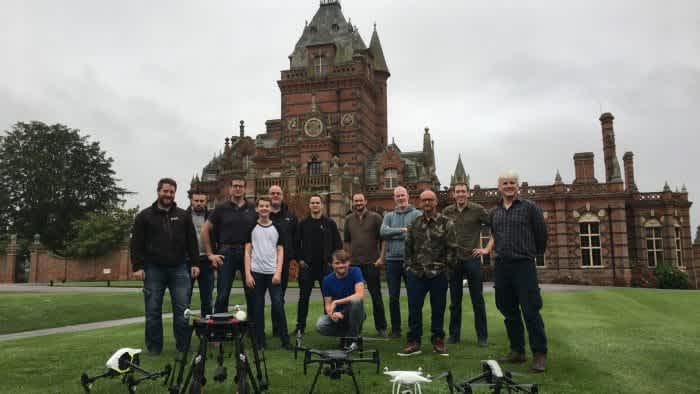
Candidates sitting a Heliguy PfCO training course.
PfCO holders argue that the CAA already has their details, as part of the permission - so is essence they will have to register twice - while this 'tax' comes on top of existing PfCO fees.
For instance, each commercial drone operator who has been granted CAA permission will have a document from the authority granting this permission and setting out conditions for its use. This is known as a PfCO and a list of current holders of the CAA permission can be found under CAP1361: Small Unmanned Aircraft (SUA) operators holding a valid CAA permission, which is updated on a monthly basis.
Read the consultation in full and give your views
Gaining a PfCo comes at a cost too. Candidates pay in excess of £1,000 to sit their training, then it's £250 for the initial application to the CAA, followed by an annual renewal cost of £190 - which has recently gone up. PfCo holders are questioning two things - why they need to fork out on another cost, and, their biggest bugbear, why they need to register again when they already have permission to fly commercially from the CAA.
'Frankly offensive' and 'ridiculous' - PfCO holders are critical of the proposal
Meanwhile, members of FPV-UK, BMFA and LMA are also critical. A membership with FPV-UK, for instance, costs £19.99 a year and benefits include public liability insurance.
The BMFA's RC Achievement Scheme encourages remote control model flyers to improve their standard of flying and safety and the Basic Proficiency Certificates provide a measure of competence for pilots operating fixed and rotary wing aircraft fitted with stabilisation technologies. People who hold these qualifications have already proven their skills - so why the need to pay extra to show their safety record, which is already endorsed.
Many have taken to the CAA PfCO General Discussion (UK) Facebook group to voice their grievances. Among the comments:
I find the decision to charge PfCOs frankly offensive as it shows contempt for PfCOs that they have to be on 2 registers. This just makes me want to give up using drones and I'm tempted to just switch to rovers instead. It's the principle, that it would be easy to have an IT system that linked both databases but the industry is just seen as a cash cow.
Ian Hudson
Ridiculous, if you have a valid PFCO then this is registration in itself. CAA will duplicate data if you are on both databases which is breaking a basic rule of data storage ie duplicating data. Just make it clear that if you let your PfCO slip, then maybe then registration is required like a SORN on a vehicle. Its a frigging mess and needs sorting somehow !!!
Mart Booth
In a real business this would be seen as ‘double dipping’ and illegal…charging a client twice for the same thing but under two different guises!!! The CAA have my license and my Ops Manuals which each contain the serial numbers of my aircraft! Great idea for everyone outside of a PFCO but nuts for anyone in it!!
James Anderson
Does not registering with the CAA with a PfCO account for nothing.! Training, ops manual, Insured, flight data and a large fee! Those with a PfCO should not have to pay.
Martin Evans
Critics Say This Won't Stop Rogue Drone Use
There's no doubt about it, drones are increasingly attracting negative press. For many in the industry, it feels as though UAVs have become a type of 21st century bogeyman.
A recent example of this was an Airprox report which stated that two drones almost collided with a jet - at 14,000feet! This attracted a range of headline-grabbing, scaremongering stories in the media, but prompted a sceptical response from UAV experts, including Heliguy.
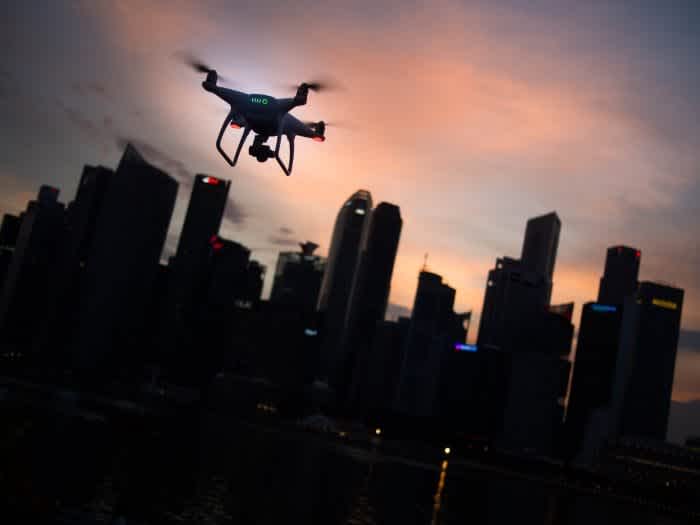
Picture by Goh Rhy Yan
The disruption at Gatwick Airport before Christmas seems to have provided a springboard for such mass anti-drone hysteria, while new drones rules and the upcoming legislation are an attempt to tackle a perceived threat from rogue drones.
As part of the DRS, it is proposed that operators will need to pay their annual fee, receive a registration number and then label their drones.
However, opponents of the DRS charge proposal believe that it will do little to clamp down on illegal UAV use and is instead impacting the majority of responsible drone operators. They also argue that the safety record of drones is actually really good. After all, how many people have been killed by a drone?
Critics claim that those who use drones illegally will not register for the scheme - defeating its purpose
On Facebook, Simon FPV Dale, wrote: "Those who are using drones illegally won't register. Let's say a drone is found somewhere it shouldn't be with no registration number on it. Those who are registered nearby (the safe and compliant ones who are already members of associations, are insured and have their name and address onboard) will get a knock on the door."
On the CAA's Twitter page, Andrew Robinson commented: "That expensive identity check achieves nothing. Lawbreakers won't falsely pay you £16.50 a year for registration, they'll just copy a number from another drone."
Will This Harm The Industry?
There is a fear that the proposed legislation could have a detrimental impact on the industry.
Both FPV-UK and the BMFA have pointed to the negative impact that the registration procedures have had in France, which remember is free. Despite this, they claim that there has been a 10 per cent drop-off in participants.
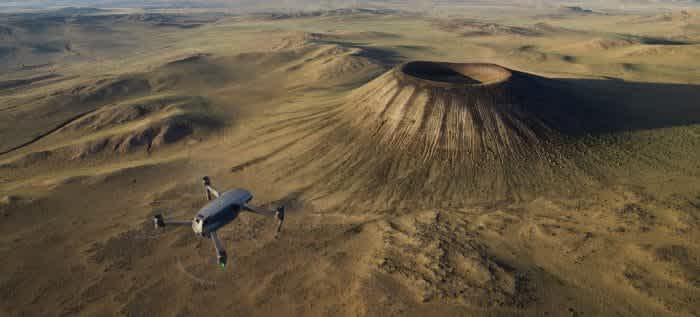
A statement from the FPV-UK reads: "The proposed fee for registration is £16.50 per annum which we consider to be excessive and a barrier to participation in the hobby.
"We believe that the drone registration scheme will be detrimental to the future of unmanned aircraft flying in the UK and place requirements on us which are excessive and more onerous than those for manned aviation – despite the DfT/CAA acknowledging that radio control flying has established an excellent record over the last century."
Meanwhile, on the CAA PfCO General Discussion (UK) Facebook group, some users have said that they won't bother renewing in the future. Could this force some people away from the industry?
A Rallying Call To Lobby Against The Proposals
A number of organisations have come out to speak against the proposal and to urge their members to lodge critical feedback with the CAA as part of the consultation process.
One of those embroiled in the thick of the battle is the BMFA, which has not held back in its criticism. Describing the announcement of the consultation as a bombshell, the BMFA says that it is strongly opposed to the proposals, believing they 'represent the worst excesses of gold plating of regulations'.
"We believe the proposals will be detrimental to the future of model flying in the UK," says the BMFA
A post on their website reads: "The fee the CAA is proposing is £16.50 per annum which is significantly more than the cost levied on model flyers in any other EASA (European Union Aviation Safety Agency) country, something they have conveniently omitted from the comparison figures in the document.
"We believe that the proposals will be detrimental to the future of model flying in the UK and place requirements on us which are more excessive than those for manned aviation – despite the DfT (Department for Transport)/CAA acknowledging that model flying has established an excellent record over the last century.
"The UK Model Flying Associations are strongly opposed to the CAA’s proposals and believe that they represent the worst excesses of ‘gold plating’ of regulations (something which the CAA are committed to avoid).
"We would strongly encourage all members to respond to the consultation and register their concerns without delay (please encourage your club mates to do the same) before the UK Government/CAA destroy model flying in the UK.
FPV-UK is urging people to contact their local MP and raise concerns about the proposals
"The UK Model Flying Associations will continue to work with the CAA & DfT and bring political pressure to bear to try and minimise the impact of excessive regulation on our members, but we need your support to show the strength of feeling, so please respond to the consultation."
Another to nail their flag to the mast is FPV-UK, which has labelled the proposal 'absolutely outrageous' and you'll get 'nothing to show for it'.
Read the consultation in full and give your views
Fleshing out the argument, Simon Dale, FPV-UK Chief Executive, told Heliguy: "£16.50 per year is bound to put a lot of people off flying in the UK. We know that many pilots, aircraft designers, aircraft engineers, engineers, etc started off with model planes, and more recently drones, so this may have a knock-on effect down the line."
Similar to the BMFA, FPV-UK is encouraging its members to inundate the CAA with their comments.
"16.50 per year is bound to put a lot of people off flying in the UK," says FPV-UK
Recently, FPV-UK issued a call to action, urging opponents to contact their local MP, the Minister for Aviation and the CAA Chief Executive. To read the full document, entitled Radio Control Flying Under Threat - Call To Action - Please Act Now, click here.
Another to respond to the consultation is ARPAS UK - The UK Drone Association. An online statement reads:
Over the past few days, we have listened to our members' feedback, and although it is generally accepted that registration is a necessary step to progress the development and trust in our industry, there have been a number of questions which have been raised:
Whilst we understand that the set up costs have been funded by the DfT, the annual running cost is very high indeed. We feel that the procurement process should be reviewed.
Will the development and education costs not reduce over time, and if so, how will this be reflected in the fee that operators will pay?
How will the fee affect the number of young people who are entering into the drone industry, and what can be done to ensure they are not discouraged?
How are the CAA proposing to streamline this registration system with the PfCO application process?
We understand that the CAA has received a high number of responses so far, and we are pleased that so many people are having their say on these proposals. We are also aware that other affected trade associations have voiced their concerns with the proposal and we will work with them to try and reach a fair outcome for all. We encourage members who are affected by this proposal to submit their personal responses to ensure that their voices are heard and to contact us if there are any points you would like us to raise in our response, or in our ongoing discussions with the regulators.
Once all the facts and positions are understood, ARPAS shall submit a response on behalf of our members and will keep you informed with any progress that is made. We continue to believe that a fair and productive outcome can be gained through this process and will ensure that your voices are represented at the highest levels.
Another to question the scheme is Airborne Cameras Aerial Photography and Video Services, which feels that 'the amount has been overinflated' and the 'renewal for operators is too often', adding 'a more reasonable period of time should be three years, with a higher initial fee and reduced renewals'.
Meanwhile, a YouTube video published by xjet and called Why The CAA's Proposal For UK Drone Registration Is Outrageous, has been liked by more than 2,000 people.
CAA Twitter Page Inundated With Complaints
Grievances have been voiced on the CAA's own Twitter page. Indeed, the organisation's promotional tweet has been bombarded with negative comments. To give a flavour, comments include:





On The Other Side Of The Coin - Those Who Aren't Against The Charges
While there has been plenty of disgruntlement, it is important to state that not everyone who has reacted to the consultation is against the proposal.
And, a question to potentially throw into the mix is, are objectors more vocal than supporters, ie that's why the majority of comments are anti the proposals?
Those to speak out in favour of the charge believe that £16.50 is not a lot to pay and is not a king's ransom
One of those to publicly voice his support is a chap called Barry, through his On The Kitchen Table YouTube channel.
The presenter, who says that the majority of his job is with drones, tells viewers why he is not going to contest the charge idea.
During the seven-minute feature, he says: "I don't mind paying £16.50 to be registered as a drone pilot. That is fine with me, it is my job. I understand hobbyists will moan, saying it's my hobby, why should I do it! But how much do you put into your hobby? How much does the aircraft cost?
Read the consultation in full and give your views
"If you were fishing you would need a fishing rod licence for your hobby. You choose to fly, so why not pay the £16.50 - which I see as a very fair figure - get registered and be legal? It is not a king's ransom. I don't get why everybody is making a big deal over £16.50.
"For law-abiding people, I don't see the problem in this scheme. Besides, you can't buy a drone over 250 grams that is less than £16.50!"
Now it has to be said that not all of the comments left on his channel support the presenter's views, but there are those who have responded by saying they don't mind the charge.
Among them:
Hobbyist here and absolutely fine with it myself. It's reasonable, no more than a few cups of coffee I would buy on most days and only yearly.
ThrobbinHood
I'll be paying. That's cheap
Clive Painter
Fine with me
marxnex71
Other commentators have chipped into the debate, with James Dunthorne suggesting that the fee should be a one-off payment, with additional expense spared for a change of details.
Meanwhile, among the comments on the CAA's Twitter page, Will Spilsbury writes that he doesn't really care what the charge is - comparing it to buying a yacht, but getting hung up on the mooring fee - but just wants tho 'endless stream of bad press to stop', adding that the media is turning the whole country against drones.
How The CAA Has Justified These Costs?
The CAA has tried to justify the charging proposals and states that it does not seek to profit from the scheme’s charges.

The CAA says that should it significantly over-recover its running costs, then it may reduce charges over subsequent years. Conversely, should it significantly under-recover, it may review whether to defer some of the costs associated with improving the system until such time that the volumes attain the 170,000 level.
Although, perhaps the word 'may' is a bit too non-committal for critics!
The CAA says that it may reduce the charges over subsequent years
As mentioned previously, opponents have questioned the price of setting up and running the scheme, believing it is far too high. With this in mind, how has the CAA justified the costs? Here is a break down:
Fixed costs such as: IT service hosting; IT security package; CAA’s Drone Registration team members (c £1m per annum);
A major national drone safety and registration requirement campaign (c £0.3m per annum);
Variable costs that will be linked to user volumes e.g. cost of identity verification, payment processing and direct user digital communication, and call centre support, particularly during the initial set up phase (c£0.55m per annum);
On-going upgrade of drone registration service to provide additional functionality and service improvements described in paragraph 2.2 above (c £0.95m per annum).
Read the consultation in full and give your views
The CAA says that a number of considerations have been made:
To set a charge at the lowest possible level, in particular, to avoid the charge being set at a level that would act as a deterrent for operators to register;
To set a charge at a level that enables the CAA to recover the costs of running the service; improve the service year-on-year based on user feedback and to enable the CAA to respond to legislative changes;
To avoid unacceptable aggregate financial risk to the CAA given the uncertainty about the number of drone operators who should and will register.
Comparing the registration fee to other licences, the CAA says that the drone charge is 'substantially less' than a fishing licence, and that larger volumes equate for the cheaper price of a UK driving licence and passport.
CAA says that larger volumes equate for the cheaper price of a UK passport or driving licence, compared to the proposed drone charge
The CAA accepts that the proposed charge is higher than the FAA (Federal Aviation Administration - America) and IAA (Irish Aviation Authority drone registration charge, but states that the FAA charge is heavily subsidised, and it is understood that the IAA charge is under-recovering its associated costs.
However, critics have pointed out that the CAA makes no mention in the consultation document of the fact that it is free to register in France.
The Next Steps
In terms of the consultation, the CAA is seeking answers to the following questions from drone users, model aircraft operators, relevant industry stakeholders and the public:
What is your view on the CAA’s proposed charge, in terms of the level and structure of the charge?
Do you have alternative ideas about how the CAA could cover the costs of running the registration scheme?
Are the CAA’s estimated volumes appropriate for the make-up of drone operators in the UK, based on existing sources of data and your own observations?
This consultation will run until June 7, 2019. Following this, and having considered the responses, the CAA will make a final decision on the registration scheme charges in July 2019.
Read the consultation in full and give your views
Further information on the Drone Registration Scheme will be communicated to the public from September 2019, through a dedicated Communications campaign.
These activities will be carried out ahead of the registration opening date, October 1, 2019, with the registration of drone operators becoming mandatory from November 30, 2019.
It is planned that this charge will be contained within the General Aviation Scheme of Charges which will be published on 16 September with an effective implementation of October 1, 2019.
Heliguy contacted the CAA to give the organisation a chance to respond to the negative comments, but we did not receive a reply at the time of publishing this blog article.
